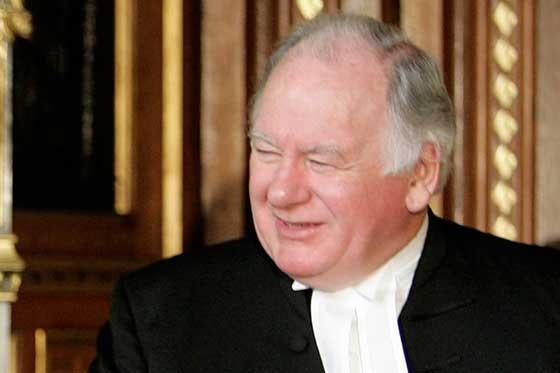
A move to limit the success fees which “no-win, no-fee” lawyers can charge in defamation cases came under sustained attack from former Commons Speaker Lord Martin of Springburn last night.
The crossbench peer sought to hold up the process of the Lords agreeing the plans by tabling a “motion of regret” against a Statutory Instrument laid by Justice Secretary Jack Straw, which seeks to cut success fees from 100 per cent to 10 per cent.
Having been given assurances that further consultations would be carried out on the order, Martin withdrew his motion without a vote.
Lord Martin told peers that he would not have objected to the proposals if the reduction had been to 50 per cent instead of 10 per cent.
He paid tribute to the work of a “no win, no fee” lawyer who had advised him and said that instead of the current proposals he wanted legislation that “insists on responsible journalism”.
“It is not the small local radio or the small local newspaper who gives anyone any trouble,” he said.
He said that it was national newspapers who “specialise” in “attacks” on people who caused a problem.
“If they want to save funds, if they don’t want success fees to be paid, then why don’t they get their facts right?” he asked.
Lord Martin claimed that he had been harassed by journalists ringing his doorbell and banging on his front and back doors.
“Why should other members of my family be terrified?” he asked. “They are not in public life, they don’t carry party membership, some of them are children and yet they have been subjected to this terror.
“If that was happening in Eastern Europe the same newspapers would be attacking those in Eastern Europe.”
He added: “They say of people in public life, `if you don’t like the heat get out of the kitchen`.
“But there are many men and women who are not in entertainment, who are not in public life, but somewhere along the line someone says something about them that they feel they should get justice and this system gives them justice.”
Lord Martin’s motion of “regret”, claims there was not been “sufficient time for consultation with all of the professional and legal bodies concerned”.
It also pointed to the “benefit of no-win, no-fee arrangements for those on modest and low incomes”.
By laying his motion, he forced a debate on the issue on the floor of the House, although even if his motion is passed it would not prevent the Conditional Fee Agreements (Amendment) Order 2010 coming into force.
At present, lawyers working on conditional fee arrangements (CFAs) can claim success fees of up to 100 per cent – doubling their normal fees – from the losing defendants in defamation and privacy cases.
Media organisations say that the success fee, intended to enable lawyers who work on CFAs to use the money raised to finance any cases they lose, have made costs in defamation and privacy cases grossly disproportionate.
They also say it has had a chilling effect on freedom of expression, with editors either not running stories because of the risks of a highly expensive libel action, or settling cases they might be able to defend simply to avoid huge costs.
Junior justice minister Lord Bach, introducing the order, said that the change was intended to “protect the public interest”.
He said that it was an “interim measure” while wider reform of the libel system was considered.
In 2007, it emerged that Lord Martin had spent more than £20,000 of taxpayers’ money hiring lawyers to challenge negative press stories about him.
He also led attempts to keep details of MPs’ expenses claims secret by fighting a Freedom of Information request.
His handling of the controversy led to him becoming the first Speaker to be forced from office in 300 years.
Former Lord Chief Justice Lord Woolf also opposed the reduction of the success fee to 10 per cent.
He told peers: “It appears clear that not enough research, not enough consultation, has taken place to see what is the consequences of what is proposed.”
He said the Government was “putting the cart before the horse” in proposing the measure before deciding which parts of a report into civil litigation costs by Lord Justice Jackson to implement.
Lord Bach, winding up, said the Government was “some way off” deciding what parts of the Jackson reforms it wanted to take on board. He said there was an “urgency” to deal with the present issue but the order would be reviewed after 12 months.
He added: “Governments have to be incredibly wary, incredibly careful about curtailing press freedom in any way.
“I might well share some of the views Lord Martin has about how some of the press conduct themselves but I have to resist, as I think we all do, the temptation sometimes to say ‘gosh I wish they weren’t allowed to do this, I wish they weren’t allowed to do that’.
“To say that is, of course, an extremely serious thing to do for any Government.”
The order, which was then passed without a vote, is now set to be debated in a House of Commons committee on Monday.
Email pged@pressgazette.co.uk to point out mistakes, provide story tips or send in a letter for publication on our "Letters Page" blog

